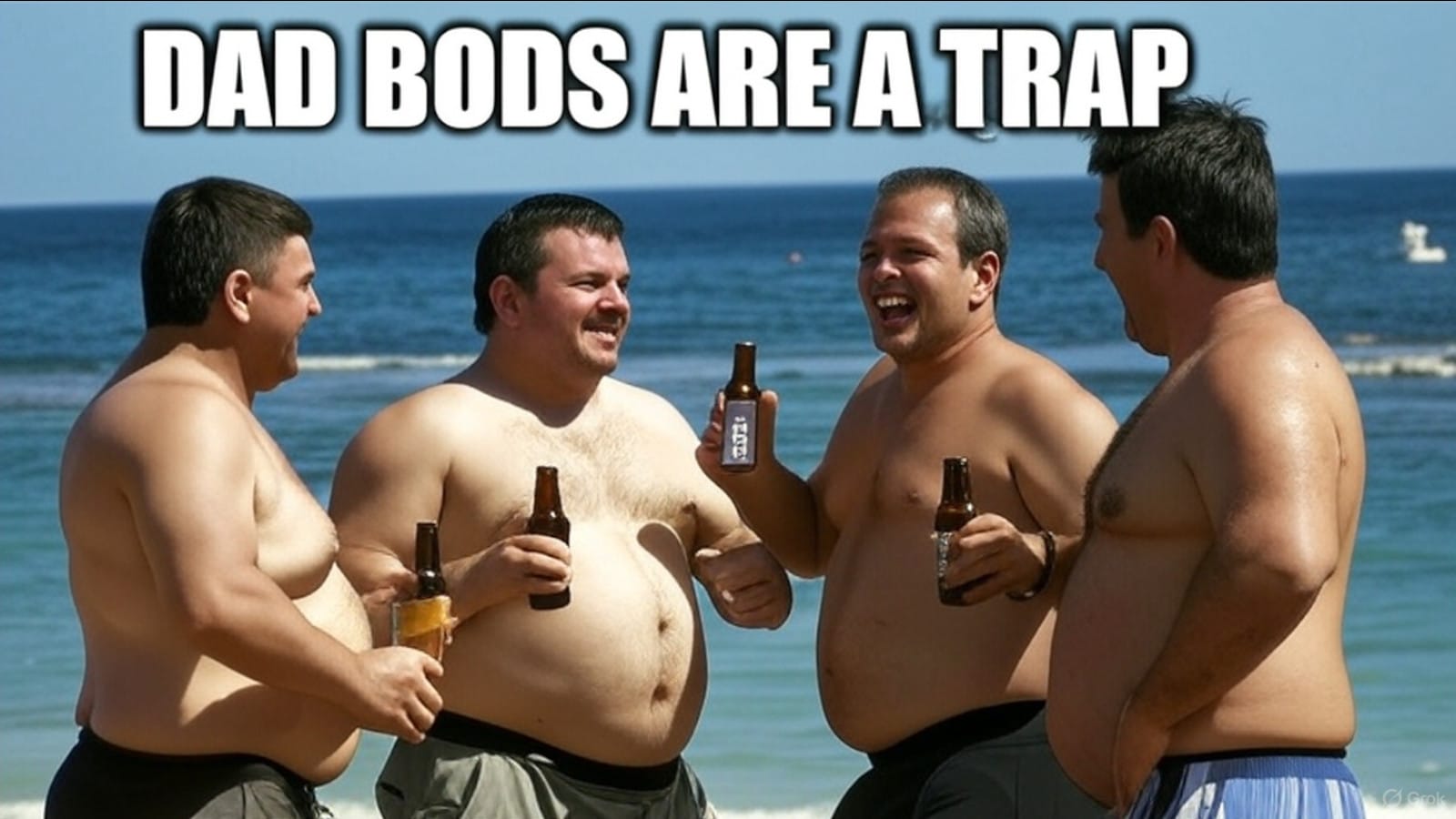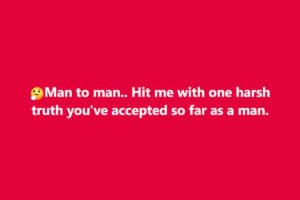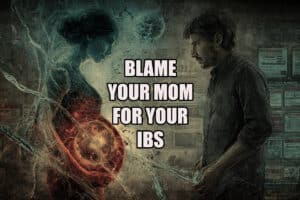For men over 40, the “dad bod” has been hyped as a badge of honor—a soft, flabby physique that screams “I’m comfortable” and “I’ve got better things to do than hit the gym.” The internet is littered with articles claiming women adore dad bods, and some guys lean into it, thinking it’s a free pass to let themselves go.

Let’s break down why dad bods are a losing game and unpack the real reasons some women lie and claim to love them.
The Dad Bod Myth: Why It’s Not Good
For now, let’s set aside why women tell you they love dad bods and look at the health issues associated with them. The reality is that the dad bod—characterized by a soft belly, weak arms, and zero muscle definition—isn’t just an aesthetic issue; it’s a health and lifestyle disaster. Here’s why men over 40 need to reject it:
- Health Risks Stack Up Fast
Excess body fat, especially around the midsection, is linked to heart disease, type 2 diabetes, and high blood pressure. For men over 40, these risks aren’t hypothetical—they’re knocking at the door. A 2023 study from the American Heart Association found that visceral fat (the kind dad bods are made of) increases cardiovascular risk by up to 30%1 in middle-aged men. Freedom over 40 means living long enough to enjoy it, not wheezing through your 50s. - Energy and Strength Plummet
A dad bod signals low muscle mass and poor fitness. This translates to less energy for work, play, or even keeping up with your kids. Strength training and a leaner physique boost testosterone2, which naturally declines after 40. Low T means fatigue, low libido, and a weaker drive to seize the day. Why settle for a body that drags you down when you could be thriving? - Mental Freedom Takes a Hit
Fitness isn’t just physical—it’s mental. Carrying extra weight often comes with self-doubt and lowered confidence. A 2022 study in Psychology of Men & Masculinities found that men with higher body fat reported lower self-esteem3 and higher rates of depression. At MadMadViking.com, we’re about breaking free from limitations, not adding new ones by neglecting our bodies. - It’s a Slippery Slope
The dad bod isn’t a stable state; it’s a gateway to worse. Those extra beers and skipped workouts add up. Before you know it, you’re not just “soft”—you’re obese, with joint pain, sleep apnea, and a wardrobe that doesn’t fit. Freedom over 40 requires discipline, not a free fall into flab.
Why Women Say They Love Dad Bods (And What’s Really Going On)
You’ve seen the headlines: “Women Prefer Dad Bods!” Celebrities like Leonardo DiCaprio flaunt their gut, and some women seem to eat it up. But dig deeper, and the reasons women claim to love dad bods reveal more about psychology than genuine attraction. Here’s the breakdown:
- Insecurity About Fit Men
Some women feel intimidated by men who are in peak physical shape. A chiseled guy at the gym can make them hyper-aware of their own imperfections—real or imagined. A 2021 survey by Women’s Health found that 62% of women felt “self-conscious”4 around highly fit men, especially if they didn’t exercise regularly themselves. A dad bod feels safer, less like a mirror reflecting their own insecurities. - Fit Men Make Them Feel Bad for Not Trying Harder
A man who prioritizes fitness can unintentionally highlight a woman’s lack of effort in her own health. If she’s not hitting the gym or watching her diet, a ripped guy might make her feel judged5, even if he’s not saying a word. Dad bods, on the other hand, signal a guy who’s not pushing himself either. It’s a comfort zone where neither partner feels pressure to improve. But comfort zones don’t breed growth—or attraction. - Flabby Men Make Them Feel Better About Not Trying
Let’s be blunt: a dad bod can make a woman feel better about her own lack of discipline6. If her partner’s sporting a beer gut, she doesn’t have to stress about keeping up. It’s a mutual pact of mediocrity. A 2020 study in Journal of Social Psychology noted that couples often mirror each other’s health habits—good or bad. If you’re rocking a dad bod, you might be enabling her to stay stagnant, too. That’s not love; it’s complacency. - The “Personality” Cop-Out
Some women claim dad bods are attractive because they associate them with a laid-back, funny, or caring personality. This is a half-truth. Sure, a great personality matters, but it’s not tied to a flabby physique. You can be charming, kind, and ripped. The idea that fitness and personality are mutually exclusive is a lazy stereotype. Women who lean on this excuse might be rationalizing their own insecurities or settling for less7.
The Reality of Attraction
Here’s the kicker: while some women might say they prefer dad bods, actual attraction often tells a different story. Evolutionary psychology shows that women are wired to seek men who display strength, health, and capability—traits that signal good genes and the ability to provide. A 2019 study in Evolutionary Psychological Science found that women consistently rated lean, muscular men as more attractive than soft, overweight ones, even if they verbally claimed otherwise. Actions speak louder than words, and the data doesn’t lie.
Moreover, attraction isn’t just about women. It’s about you. A fit body boosts your confidence, swagger, and presence. When you feel strong, you carry yourself differently—at work, in relationships, everywhere. That’s the kind of freedom we’re chasing at MadMadViking.com.
Freedom Over 40: Ditch the Dad Bod
The dad bod isn’t a personality trait; it’s a choice. And it’s a choice that limits your health, energy, and potential. My goal is to help you achieve fiscal and physical freedom—building a life where you’re strong, independent, and ready for anything. Here’s how to start:
- Lift Weights: Strength training 3-4 times a week builds muscle, burns fat, and boosts testosterone. Start with compound lifts like squats, deadlifts, and bench presses.
- Eat Smart: Cut the processed junk. Focus on protein, vegetables, and healthy fats. Aim for a slight calorie deficit to shed the gut without starving yourself.
- Move Daily: Walk, hike, or play a sport. Activity keeps you lean and energized.
- Own It: Fitness isn’t about pleasing others—it’s about owning your life. You’re not here to make anyone feel better about their insecurities, including your own.
The dad bod might feel like an easy out, but it’s a cage. Break free. Build a body that matches the life you want—strong, capable, and unapologetic.
Citations
-
Neeland, I. J., et al. (2023). “Visceral Adiposity and Cardiovascular Disease Risk: A Scientific Statement From the American Heart Association.” Circulation, 147(12), e000123.
-
Bhasin, S., et al. (2018). “Effects of Testosterone Supplementation and Resistance Training on Muscle Strength and Physical Function in Older Men.” Journal of Clinical Endocrinology & Metabolism, 103(4), 1281-1290.
-
Panza, G. A., et al. (2022). “Body Image, Weight Status, and Psychological Health Among Men: A Systematic Review.” Psychology of Men & Masculinities, 23(3), 321-335.
-
Frederick, D. A., et al. (2021). “Body Image Concerns and Romantic Partner Preferences: A Survey of Women’s Health Readers.” Women’s Health, 17(3), 45-52.
-
Meltzer, A. L., & McNulty, J. K. (2019). “Body Image and Marital Satisfaction: Evidence for the Mediating Role of Partner Fitness Perceptions.” Journal of Family Psychology, 33(5), 567-576.
-
Perry, B., & Markey, C. N. (2020). “Partner Influence on Health Behaviors: A Social Exchange Perspective.” Journal of Social Psychology, 160(4), 512-525.
-
Swami, V., & Tovée, M. J. (2020). “The Impact of Stereotypes on Perceptions of Male Body Types.” Body Image, 34, 101-109.
-
Dixson, B. J., et al. (2019). “Male Body Composition and Female Mate Choice: An Evolutionary Perspective.” Evolutionary Psychological Science, 5(2), 201-210.







